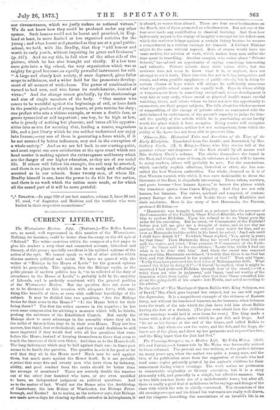CURRENT LITERATURE.
The Westminster Review. July. (Triibner.)—The Belles Lettres are, as usual, well represented in this number of the Westminster. Nothing, for instance, could be better than the essay on the old epic of -"Roland." The writer contrives within the compass of a few pages to give his readers a very clear and connected account, historical and literary, of this poem; specially excellent is his spirited epitome of the action of the epic. We cannot speak so well of other articles which discuss matters political and social. We have no quarrel with the writer of "Bishops in the House of Lords" for the general opinion which he propounds. This opinion, that the Bishops ought, as the polite phrase of modern politics has it, "to be relieved of the duty of attendance in the House of Lords," is probably held by the majority of Liberals, and is perfectly consistent with the general position of the Westminster Review. But the question does not seem to us to be discussed on this occasion with adequate force, with any- thing like breadth of view, or even with sufficient knowledge of the subject. It may be divided into two questions, "Ara the Bishops better for their seats in the House ?" "Is the House better for their being there ?" The first the writer answers in the negative ; he has even some compunction for advising a measure which will, he thinks, prolong the existence of the Established Church. But surely the Bishops show to more advantage in the assembly where they sit in the midst of laymen than they do in their own House. They are less narrow, less timid. less ecclesiastical; and they would doubtless be still more improved if they would deal with all the questions that come before the House, instead of keeping themselves to those that seem to touch the interests of their own Order. And then as to the House itself. The long indictment which may be laid against their vote in times past seems to be beside the question. The question is,—is it for good or for evil that they sit in the House now ? Much may be said against them, but much more against the House itself. Is it not probable .a priori that some five and twenty men who have risen by industry, ability, and good conduct from the ranks should be better than the average of members? There are scarcely double the number out of the other four hundred who have, or aro even qualified to have, an independent judgment on political questions. And as to the matter of fact. Would not the House miss the Archbishop of Canterbury, the late Bishop of Winchester, the Bishops Peter- borough, and Exeter? As to saying, as the reviewer says, that Bishops are made now-a-days for clearing up double entendres in Aristophanes, it
is absurd, or worse than absurd. There are font- ex-schoolmasters on the Bench, two of them promoted as schoolmasters. But not one of the four ever made any contribution to classical learning. And then how ludicrously unjust is the charge of haughty contempt for his fellow-mon which the reviewer brings against a certain bishop because ho secures a compartment in a railway carriage for himself. A Cabinet Minister might do the same without reproof. Both of course would have the same motive, the mission of work, which makes busy men utilise the
time spent in travelling. Another essayist, who writes about "Private Schools," has missed an opportunity of saying something interesting and valuable. Private schools have their raison d'are, but the reviewer does not seem to know what it is, or anyhow, does not attempt to set it forth. Their function lies not in being antagonists and rivals, and even possible supplanters of public schools, but in doing for certain classes of boys which will always ba sufficiently numerous what the public school cannot do equally well. Boys in whose ability or temperament there is something exceptional, Whose development is very late or very early, whose moral or physical health wants careful watching, these, and others whom we have not now the opportunity to enumerate, are their proper subjects. The talk about the wholesomeness of competition, of the energy of private effort as contrasted with the sloth induced by endowment, of the parent's capacity to judge for him- self the quality of the article which he is purchasing, seems hardly worth the place which it hero occupies. Every reader will recognise in it one of the mistakes, neither few nor unimportant, from which the ability of Mr. Lowe has not been able to preserve him.


































 Previous page
Previous page